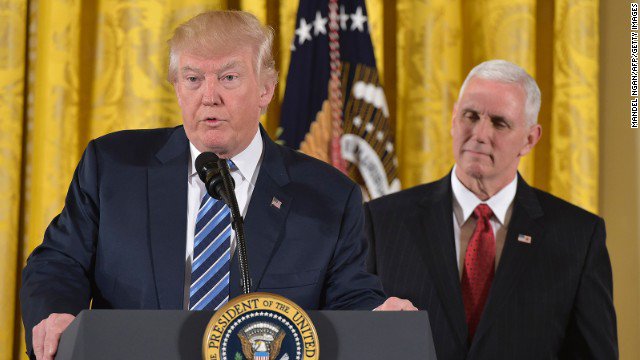
Recent Russian military provocations are probably motivated by President Vladimir Putin’s belief that President Donald Trump has been politically weakened by controversies surrounding his administration, Trump said Thursday.
“Probably Putin assumes that he’s not going to be able to make a deal with me because it’s politically not popular for me to make a deal,” he said. Trump spoke at a news conference in which he blamed “fake news” and “leaked” information for a flurry of media reports about questionable contacts between his campaign and transition and Russian officials.
“The false, horrible, fake reporting makes it much harder to make a deal with Russia,” he said. Putin was “sitting behind his desk and he’s saying . . . ‘It’s going to be impossible for President Trump to ever get along with Russia because of all the pressure he’s got with this fake story.’ ”
Trump suggested that he was unlikely to respond to Russian actions over the past few days – including the buzzing by Russian warplanes of a U.S. naval vessel in the Black Sea, the appearance of a Russian spy ship 30 miles off the Connecticut coast, and the reported deployment of ground-based cruise missiles in violation of a major arms-control treaty.
Those actions were “not good,” Trump said. “But hopefully, I won’t have to do anything. But I’m not going to tell you.”
Trump spoke as his top national security officials made their first formal forays into U.S.-Russian relations. Secretary of State Rex Tillerson met in Germany with Russian Foreign Minister Sergei Lavrov, while Defense Secretary Jim Mattis, in Brussels, spoke of Russia with his NATO counterparts.
Gen. Joseph Dunford Jr., chairman of the Joint Chiefs of Staff, was also in Azerbaijan for a Thursday meeting with Valeriy Gerasimov, the chief of the general staff of Russia’s armed forces.
Tillerson, a former chief executive for Exxon with no previous experience in public office, attended nearly a dozen meetings with his diplomatic counterparts at a meeting in Bonn of the Group of 20 conference of major world economies. In his first public statement since taking office, he told reporters he had discussed a “range of issues” during an hour-long session with Lavrov, although the only one he specifically mentioned was the ongoing violence in eastern Ukraine.
That conflict began when Russia invaded and annexed Crimea in 2014, then backed separatists in eastern Ukraine in what has become a grinding war, despite a deal to end it, called the Minsk agreement, negotiated with Putin by the leaders of France and Germany.
“As I made clear in my Senate confirmation hearing,” Tillerson said, “the United States will consider working with Russia when we can find areas of practical cooperation that will benefit the American people.” He said he expected Russia to “honor its commitment to the Minsk agreement” and that the United States “will consider working with Russia when we can find areas of practical cooperation that will benefit the American people.”
Lavrov said after the meeting that Tillerson had confirmed the administration’s “readiness to overcome this period,” in which relations were “seriously undermined by the Obama administration,” according to the Russian news agency Tass.
“The issue of sanctions was not discussed” with Tillerson, Lavrov said. President Barack Obama imposed sanctions and all but broke all military contact with Russia in 2014 for its activities in Ukraine. Last December, additional sanctions were levied for what U.S. intelligence agencies said was interference in the American presidential election on Trump’s behalf.
At his news conference, Trump said getting along with Russia would be “a positive thing.”
Before Tillerson’s departure for Europe, Trump said “I told him . . . ‘I know politically it’s probably not good for me.’ The greatest thing I could do is shoot that ship that’s 30 miles offshore right out of the water,” he said of the Russian ship traveling far beyond the 12-mile U.S. territorial limit. “Everyone in this country’s going to say, ‘Oh, it’s so great.’
“That’s not great. I would love to be able to get along with Russia,” Trump said, but “fake reporting makes it much harder to make a deal with Russia.”
Trump spoke highly of Putin as a “strong leader” throughout his campaign and said repeatedly that Russia and the United States should cooperate in counterterrorism operations against the Islamic State, especially in Syria, where they are currently on opposite sides of a civil war.
But his repeated desire to “make a deal” with Russia has increased concern in Europe, where allies worry that would mean playing down a strong response to what they see as Russian military aggression, including on NATO’s eastern border.
Mattis, who has called Russia the No. 1 threat to U.S. security, said in Brussels that Russia will need to “prove itself first” before the alliance or the United States were willing to let their armed forces collaborate.
Speaking at NATO headquarters, he told reporters that the conditions are not currently right for U.S. and Russian forces to work together.
“We are not in a position right now to collaborate on a military level, but our political leaders will engage and try to find common ground or a way forward so that Russia, living up to its commitment, can return to a partnership of sorts here with NATO,” Mattis said.
Without explicitly naming the United States, he said there was “very little doubt” that the Russians have “either interfered, or attempted to interfere, in a number of elections in the democracies.”
Mattis also called for NATO members to increase their defense spending, citing threats posed by Russia. Russian Defense Minister Servei Shoigu later responded that he expected the Pentagon’s position would be clarified when Dunford met with Gerasimov. Attempts to build a diplomatic dialogue with Russia from a position of strength were “fruitless,” Shoigu said, according to Tass.
(c) 2017, The Washington Post · Karen Deyoung

